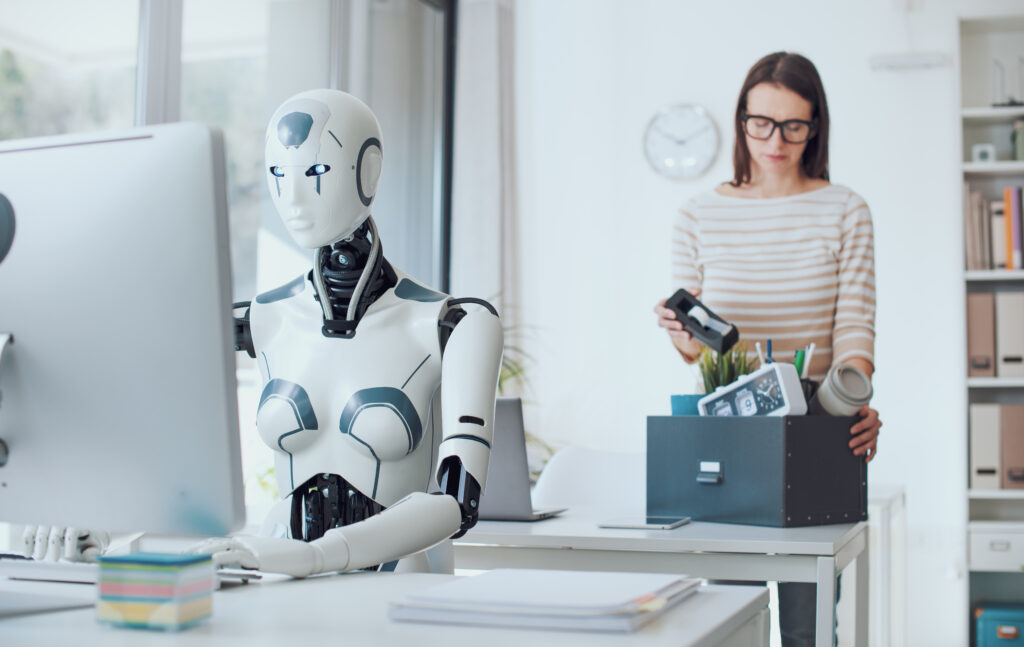Innovation and Progress: A Look into the Future of Work in an AI Economy
The advent of artificial intelligence (AI) has changed the way we work and live, and it is likely to have an even bigger impact on our world in the years to come. As we move into the future, it is essential to understand the ways in which AI is transforming our economy and how it will affect the future of work.
In this blog post, we will explore the potential implications of AI on our economy and discuss the progress and innovations that are being made to ensure its success. From automation and job displacement to ethical considerations and data privacy, this post provides an overview of how AI is poised to shape the workplace of the future. Keep reading!
What is an AI economy and how does it impact work?

Artificial intelligence (AI) is revolutionizing the way we work and live, giving rise to what is known as an AI economy. But what exactly is an AI economy, and how does it impact work?
An AI economy refers to an economic system where AI technologies and applications are central to driving productivity and growth. It encompasses a wide range of industries, from healthcare and finance to transportation and manufacturing. In an AI economy, businesses and organizations are increasingly leveraging AI to automate processes, gain insights from data, and enhance decision-making.
The impact of the AI economy on work is profound. Automation, powered by AI, is transforming traditional job roles and functions. Tasks that were once performed by humans can now be automated, leading to concerns about job displacement. However, the AI economy also creates new opportunities for human workers. While AI handles mundane tasks, humans may focus on creative, critical, and emotional work.
Moreover, the AI economy is driving the creation of new job roles and industries. As AI technologies advance, trained experts are needed to develop, implement, and maintain AI systems. This presents an opportunity for individuals to reskill or upskill in order to stay relevant in the job market.
The rise of automation and its effect on jobs

As the AI economy continues to evolve, one of the most significant impacts is the rise of automation and its effect on jobs.
Automation, powered by AI technologies, is transforming traditional job roles and functions, leading to concerns about job displacement. Tasks that were once performed by humans can now be automated, resulting in the need for fewer workers in certain industries.
However, it’s important to note that the rise of automation does not necessarily mean the end of human jobs. In fact, the AI economy creates new opportunities for human workers. As AI takes over routine and repetitive tasks, humans can shift their focus to higher-value work that requires creativity, critical thinking, and emotional intelligence.
This shift in job responsibilities opens up new possibilities and allows workers to explore different areas of expertise. Instead of spending time on mundane tasks, employees can engage in more fulfilling and intellectually stimulating work. This not only benefits individuals but also contributes to overall job satisfaction and productivity.
While automation may lead to some job displacement, it also drives the creation of new job roles and industries. As AI technologies progress, skilled professionals will need to develop, implement, and manage AI systems. This allows individuals to reskill or upskill to stay relevant in the labor market and take advantage of AI economy-created jobs.
New opportunities for human workers in an AI-driven economy

In an AI-driven economy, the rise of automation may raise concerns about job displacement, but it also presents new opportunities for human workers.
As AI automates repetitive tasks, employees can focus on more significant work that demands creativity, critical thinking, and emotional intelligence. It increases job satisfaction, productivity, and allows people to explore new fields.
In an AI economy, human workers can leverage their unique skills and abilities to collaborate with AI technologies and achieve greater results. AI can assist professionals in data analysis, decision-making, and problem-solving, enhancing their capabilities and enabling them to deliver higher-quality work. For example, in healthcare, AI can analyze patient data and medical records, allowing doctors to make more accurate diagnoses and personalized treatment plans. In finance, AI can automate repetitive financial tasks, enabling accountants to focus on strategic financial planning and analysis.
Furthermore, the AI economy is driving the creation of new job roles and industries. As AI technologies continue to evolve, there is a growing demand for skilled professionals who can develop, implement, and maintain AI systems. This presents an opportunity for individuals to reskill or upskill in order to stay relevant in the job market and take advantage of the new employment opportunities created by the AI economy.
How companies are adapting to the AI economy

As the AI economy continues to expand, companies are actively adapting to harness the power of AI technologies. They recognize that in order to remain competitive, they must incorporate AI into their operations and strategies.
One way companies are adapting to the AI economy is by integrating AI into their existing processes. They are automating tedious operations with AI to free up staff time for more strategic work. In customer service, AI-powered chatbots handle basic inquiries, freeing up human agents to handle more complex situations.
Companies are also leveraging AI to gain insights from vast amounts of data. With AI-powered analytics, they can uncover patterns, trends, and correlations in their data, enabling them to make more informed business decisions. This data-driven approach helps companies optimize their operations, identify new business opportunities, and enhance customer experiences.
Furthermore, companies are investing in AI talent and expertise. They are hiring data scientists, machine learning engineers, and AI specialists to develop, implement, and maintain AI systems. Companies can take advantage of AI technologies and stay ahead by hiring skilled and knowledgeable teams.
In addition, companies are exploring partnerships and collaborations with AI startups and research institutions. They recognize the value of collaboration in driving AI advancements and staying competitive in the AI economy. Through these partnerships, companies can access cutting-edge AI technologies, external expertise, and explore new avenues for growth and innovation.
The importance of reskilling and upskilling for workers

In an AI-driven economy, the importance of reskilling and upskilling for workers cannot be overstated.
As automation and AI technologies continue to transform job roles and functions, it is crucial for individuals to acquire new skills and adapt to the changing demands of the job market.
Reskilling refers to learning new skills or acquiring additional expertise in order to transition into a different job or industry. With the rise of automation, many traditional roles may become obsolete, and workers need to reskill to remain employable. For example, individuals working in manufacturing may need to learn programming or robotics in order to work alongside AI systems.
Upskilling, on the other hand, involves enhancing existing skills or knowledge to meet the evolving demands of the AI economy. It involves continuous learning and staying up-to-date with the latest technological advancements. This can include gaining expertise in data analysis, machine learning, or AI development.
By investing in reskilling and upskilling, workers can position themselves as valuable assets in the AI economy. They can acquire skills to work alongside AI technologies, adapt to new roles, and take advantage of emerging job opportunities. Additionally, continuous learning not only ensures employability but also enhances personal and professional growth.
Ready to sell your property? Give us a call today and learn more about our professional photography services that can boost your property listing!
Plus, explore our virtual assistant coaching program to level up your business. Don’t forget to tune into our new podcast for even more valuable insights!
